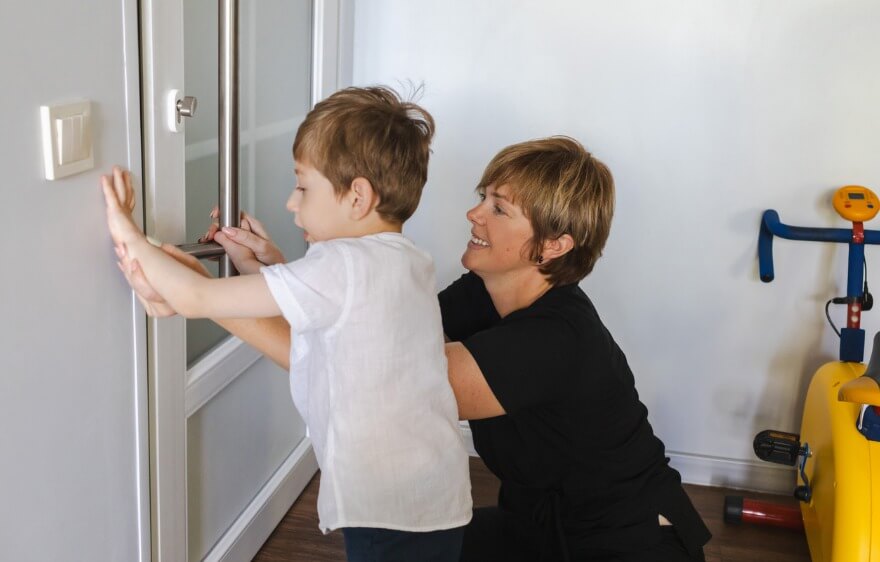As an Occupational Therapist (OT), you wear many hats — problem solver, motivator, educator, and sometimes, miracle worker. You help children navigate the world, teaching them the skills they need to live their lives to the fullest. But when it comes to landing that dream job or advancing your career, how do you make sure that your resume stands out? In this post, we’ll dive into the top occupational therapy skills that should grace your resume and how to showcase them effectively.
The Importance of a Strong OT Resume
Before we get into the nitty-gritty of specific occupational therapy skills, let’s talk about why having a strong OT resume is so crucial. Your resume is your personal billboard — it’s the first thing potential employers see, and it needs to make a lasting impression. In a competitive job market, especially in the pediatric home health sector, your resume isn’t just a formality — it’s your ticket to new opportunities.
A strong resume not only highlights your technical skills and experience but also showcases your passion, creativity, and ability to connect with clients. It should tell a story about who you are as a therapist and what you bring to the table. Employers are looking for someone who is not just technically competent but also adaptable, empathetic, and able to work effectively in a variety of settings. A well-crafted resume can help you stand out from the crowd and land that interview.
The Top 11 OT Skills To Put On Your Resume
Putting these key occupational therapy skills on your resume, can help you stand out and resonate with potential employers enabling you to fully explore your career options as an OT.
1. Pediatric Developmental Knowledge
Working in pediatric occupational therapy means understanding the intricacies of child development. This includes cognitive, motor, sensory, and emotional development. Your ability to assess and support children at various developmental stages is fundamental to your role.
Example: When listing this skill on your resume, be sure to include specific examples that demonstrate your expertise. For instance, “Extensive knowledge of pediatric developmental milestones, with experience designing individualized therapy plans to support cognitive and motor skill development in children aged 0-5.” This not only highlights your knowledge but also shows your practical application of that knowledge in real-world settings.
2. Sensory Integration Therapy
Sensory processing issues are common in children, especially those with autism or ADHD. Sensory integration therapy helps children make sense of the world around them, improving their ability to participate in daily activities.
Example: On your resume, you might include a statement like, “Skilled in sensory integration therapy, with a focus on creating tailored interventions to help children with sensory processing disorders.” Expand on this by describing specific techniques or tools you use, such as weighted blankets, sensory swings, or tactile activities. This shows that you not only understand sensory processing challenges but also have practical strategies to address them.
3. Fine Motor Skills Development
Fine motor skills are essential for daily tasks like writing, buttoning clothes, or using utensils. Your ability to assess and improve these skills in children is a crucial aspect of pediatric OT.
Example: A strong resume statement could be, “Proficient in developing fine motor skills through targeted activities, leading to significant improvements in children’s ability to perform daily tasks independently.” You can further detail your experience by mentioning specific activities or tools you use, such as using pegboards, threading beads, or practicing hand-eye coordination exercises.
This level of detail not only highlights your expertise but also demonstrates your ability to create practical, hands-on therapy plans that lead to real, measurable outcomes.
4. ADL (Activities of Daily Living) Training
Teaching children how to perform activities of daily living (ADLs) is a cornerstone of occupational therapy. These are the basic tasks that everyone needs to do to take care of themselves, like dressing, eating, and grooming. By showcasing your experience in ADL training, you demonstrate that you’re dedicated to helping children gain the skills they need to lead more independent lives, which is a key goal in pediatric home health care.
Example: When listing this occupational therapy skill on your resume, consider writing, “Experienced in ADL training, with a focus on empowering children to achieve greater independence in daily activities.” You might also include examples of how you’ve adapted activities for children with different abilities, such as using adaptive equipment or breaking down tasks into manageable steps.
5. Behavioral Management Techniques
Working with children often means navigating behavioral challenges. Whether it’s managing frustration, encouraging cooperation, or addressing attention issues, your ability to implement effective behavioral management techniques is crucial.
This occupational therapy skill is very relevant in pediatric home health, where therapists often work one-on-one with children in their home environment. Managing behavior not only enhances the therapeutic process but also helps create a more enjoyable experience for the child.
Example: A resume statement for this skill might read, “Adept in using behavioral management techniques to create a positive therapy environment and support goal achievement.” You can elaborate on specific techniques you’ve used, such as positive reinforcement, visual schedules, or social stories, and how these have helped you manage behaviors and keep therapy sessions on track.
6. Parent and Caregiver Education
In pediatric occupational therapy, you’re not just working with the child — you’re also collaborating with their parents and caregivers. Educating parents on how to support their child’s progress outside of therapy sessions is a critical part of your role. This is one of the most valuable occupational therapy skills for home health, where continuity of care is key to achieving long-term success. Demonstrating your ability to engage and educate parents and caregivers shows that you’re committed to creating a supportive, holistic approach to therapy. If you’re interested in home health, consider working with us.
Example: On your resume, you might say, “Skilled in providing education and resources to parents and caregivers, fostering continued progress between therapy sessions.” You can expand on this by describing specific ways you’ve involved parents in the therapy process, such as teaching them exercises to do at home or providing them with tools and resources to support their child’s development.
7. Adaptive Equipment Expertise
Using adaptive equipment is often necessary to help children perform daily activities more effectively. Whether it’s special seating, utensils, or communication devices, your expertise in selecting and using adaptive equipment can make a big difference in a child’s life. This occupational therapy skill highlights your ability to think critically about each child’s needs and find practical solutions that make a real impact on their daily lives.
Example: A resume statement could be, “Experienced in assessing and implementing adaptive equipment to enhance children’s ability to participate in daily activities.” You might also include examples of specific equipment you’ve used, such as splints, adaptive utensils, or specialized seating, and how these have improved a child’s function and independence.
8. Creative Problem-Solving
Occupational therapy often requires thinking outside the box to find solutions that work for each individual child. Your ability to come up with creative, customized approaches is a valuable asset in this field. This is one of the occupational therapy skills that shows potential employers that you’re not just going through the motions but are actively finding new ways to help children succeed, even when faced with obstacles.
Example: Consider including a statement like, “Creative problem-solver, skilled in developing innovative therapy solutions tailored to each child’s unique needs.” You can further illustrate this by sharing examples of how you’ve adapted activities or materials to overcome challenges or how you’ve used creative methods to keep a child engaged in therapy.
9. Collaboration and Teamwork
As an occupational therapist, you’re often part of a broader team that includes other therapists, doctors, teachers, and parents. Your ability to collaborate effectively with others is essential to providing comprehensive care. Collaboration is one of the occupational therapy skills that show you’re a team player who understands the importance of working together to achieve the best outcomes for your clients.
Example: On your resume, you might write, “Collaborative team member, experienced in working with multidisciplinary teams to develop and implement holistic therapy plans.” You can expand on this by describing specific examples of how you’ve worked with others to achieve a common goal, such as coordinating with a teacher to support a child’s success in school or collaborating with a speech therapist to address overlapping needs.
10. Documentation and Reporting
In any healthcare setting, thorough documentation is crucial for tracking progress, communicating with other professionals, and meeting legal and regulatory requirements. Your ability to maintain detailed and accurate records is a key part of your role as an OT. This skill can be an asset in home health, where you may be working independently and need to keep comprehensive records that can be easily understood by other team members or reviewed during audits.
Example: A strong resume statement might be, “Proficient in maintaining detailed documentation and progress reports to ensure continuity of care and compliance with legal standards.” You can elaborate on the types of documentation you’re experienced with, such as treatment plans, progress notes, and evaluation reports.
11. Empathy and Compassion
Last but certainly not least, empathy and compassion are at the heart of occupational therapy skills. Your ability to connect with your clients, understand their challenges, and provide support with kindness and patience is what makes you not just a therapist but a trusted partner in their journey. In pediatric home health, this skill is particularly valuable when working closely with families in their own homes. Demonstrating your empathy and compassion shows that you’re not just focused on the technical aspects of therapy but also on the human side of care.
Example: Consider including a statement like, “Compassionate and empathetic therapist, dedicated to providing person-centered care that meets the emotional and physical needs of each child.” You can further expand on how your empathy has helped you build strong relationships with your clients and their families, leading to better engagement and outcomes.
Superior OT Skills Create Superior OT Opportunities
Your resume is more than just a list of skills and experiences — it’s a reflection of who you are as a therapist and a professional. By highlighting these top occupational therapy skills, you can ensure your resume not only stands out but also truly represents your unique strengths and contributions. Whether you’re applying for a position in pediatric home health or another setting, your resume should tell a story — one that highlights your dedication, creativity, and ability to make a difference in the lives of your clients.
The Care Options for Kids team has a deep commitment to bringing families and occupational therapists together to build better outcomes and lives. We recruit and support specialists who provide the best in-home care, empowering children to reach their greatest potential and level of activity.
Join the Care Options For Kids Team!
Are you ready for meaningful work that comes with benefits and not burnout? Join the compassionate care team that helps children and families live their best lives. Our clinicians provide best-in-class pediatric nursing, therapy, and school-based services. We bring individualized care to children where they live, work, and play. We have opportunities in homes, schools, and clinics across the country.
Apply at Care Options for Kids now. We make it easy to start so you can make a difference as soon as possible.






